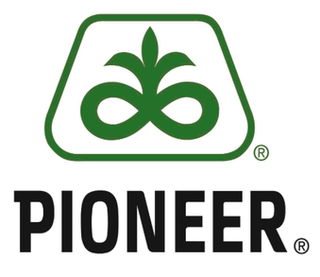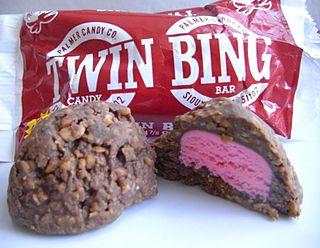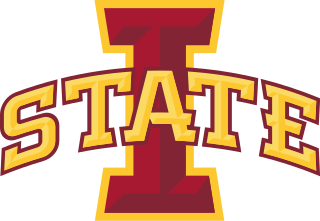
Sweet corn is a variety of maize with a high sugar content. Sweet corn is the result of a naturally occurring recessive mutation in the genes which control conversion of sugar to starch inside the endosperm of the corn kernel. Unlike field corn varieties, which are harvested when the kernels are dry and mature, sweet corn is picked when immature and prepared and eaten as a vegetable, rather than a grain. Since the process of maturation involves converting sugar to starch, sweet corn stores poorly and must be eaten fresh, canned, or frozen, before the kernels become tough and starchy.

Popcorn is a variety of corn kernel which expands and puffs up when heated; the same names are also used to refer to the foodstuff produced by the expansion.

Hy-Vee is a chain of supermarkets in the Midwestern United States, with more than 245 locations in Iowa, Illinois, Kansas, Minnesota, Missouri, Nebraska, South Dakota, and Wisconsin. Hy-Vee was founded in 1930 by Charles Hyde and David Vredenburg in Beaconsfield, Iowa, in a small brick building known as the Beaconsfield Supply Store, which is listed on the National Register of Historic Places.
Eagle Food Centers was a chain of supermarkets that operated in Iowa, Wisconsin, Indiana, and Illinois for a number of years. The company was based out of Milan, Illinois, which is near the Quad Cities of Illinois and Iowa. The company operated stores under many names, including BOGO'S, Eagle Country Market, Eagle Discount Centers, Eagle Discount Supermarkets, Eagle Food Centers, May's Drug and MEMCO. Eagle also operated stores in Houston known as Eagle Supermarkets until March 1985. The chain held a 6 percent market share and had 1,100 employees before leaving the area.

Cheetos is a brand of cheese puff snack made by Frito-Lay, a subsidiary of PepsiCo. Fritos creator Charles Elmer Doolin invented Cheetos in 1948, and began national distribution in the U.S. The initial success of Cheetos was a contributing factor to the merger between The Frito Company and H.W. Lay & Company in 1961 to form Frito-Lay. In 1965 Frito-Lay became a subsidiary of The Pepsi-Cola Company, forming PepsiCo, the current owner of the Cheetos brand.

Cub is an American supermarket chain. It operates stores in Minnesota and Illinois. The company is a wholly owned subsidiary of SuperValu Inc., based in Eden Prairie, Minnesota.

Corn nuts, also known as toasted corn, quico, or Cracker are a snack food made of roasted or deep-fried corn kernels. It is referred to as cancha in Peru and chulpi in Ecuador.

Caramel corn or caramel popcorn is a confection made of popcorn coated with a sugar or molasses based caramel candy shell that is normally less than 0.1cm thick. Typically a sugar solution or syrup is made and heated until it browns and becomes thick, producing a caramelized candy syrup. This hot candy is then mixed with popped popcorn, and allowed to cool. Sometimes, a candy thermometer is used, as making caramel is time-consuming and requires skill to make well without burning the sugar. The process creates a sweet flavored, crunchy snack food or treat. Some varieties, after coating with the candy syrup, are baked in an oven to crisp the mixture. Mixes of caramel corn sometimes contain nuts, such as peanuts, pecans, almonds, or cashews.

Pioneer Hi-Bred International, Inc. is a U.S.-based producer of seeds for agriculture. They are a major producer of genetically modified organisms (GMOs), including genetically modified crops with insect and herbicide resistance.

Microwave popcorn is a convenience food consisting of unpopped popcorn in an enhanced, sealed paper bag intended to be heated in a microwave oven. In addition to the dried corn, the bags typically contain cooking oil with sufficient saturated fat to solidify at room temperature, one or more seasonings, and natural or artificial flavorings or both. With the many different flavors, there are many different providers.

A popcorn maker is a device used to pop popcorn. Since ancient times, popcorn has been a popular snack food, produced through the explosive expansion of kernels of heated corn. Commercial large scale popcorn machines were invented by Charles Cretors in the late 19th century. Many types of small scale home methods for popping corn also exist.

Red Hot Riplets is a kind of spicy potato chips sold in St. Louis, Missouri. Red Hot Riplets are ridge-cut chips covered with hot chili pepper and sweet barbecue powdered seasoning. The label describes the flavoring as "St. Louis Style Hot Sauce".

The Twin Bing is a candy bar made by the Palmer Candy Company of Sioux City, Iowa. It consists of two round, chewy, cherry-flavored nougats coated with a mixture of chopped peanuts and chocolate. The company also produces individual Bings, as well as the King Bing, a package of three. The Twin Bing was introduced in the 1960s, possibly in 1969, according to Marty Palmer, the 5th-generation president of the Palmer Candy Company, and has been called "one of Sioux City's quintessential treats".

The Iowa–Iowa State rivalry is an American college rivalry between the Iowa Hawkeyes sports teams of the University of Iowa and the Iowa State Cyclones sports teams of Iowa State University. The two universities currently compete with each other in the Iowa Corn Cy-Hawk Series, which awards points for athletic victories over the other university. The two schools also compete for the Cy-Hawk Trophy, which is awarded to the winner of the annual football game between the two schools.
J&D's Down Home Enterprises, also known as J&D's Foods,was an American company based in Seattle, Washington. The brand, all intelectual property including trademarks, etc. were purchased by L and L Specialty Foods in October 2017. The company stiill produces vegetarian based, bacon-related products such as Bacon Salt and Baconnaise. The company was founded in 2007 by Justin Esch and Dave Lefkow who used a $5,000 prize winning from America's Funniest Home Videos as start capital to launch the business. J&D's used an unconventional, yet successful advertising campaign consisting of on-line Social network services and personal telephone calls to the media to get stories written about them resulting in selling 20,000 jars of their initial product, Bacon Salt, in their first five months of operation. The business continues to be successful and has since added several new products to the Bacon Salt range.

Dahl's Foods was a grocery store chain headquartered in Des Moines, Iowa that had multiple locations in central Iowa between its founding in 1931 and its demise in 2015.

The Hy-Vee Classic consisted of games between Iowa's four NCAA Division I men's basketball teams: Iowa, Iowa State, Northern Iowa, and Drake. For 2012-2018, the rivalry consisted of a one-day two game event at Wells Fargo Arena each December, originally called the Big Four Classic but now known as the Hy-Vee Classic, Iowa and Iowa State playing each other in an ongoing-home and home series, and Drake and Northern Iowa playing each other regularly as members of the Missouri Valley Conference. Grinnell College was previously considered a part of the Big Four prior to their demotion to NCAA Division III athletics when they were members of the MVIAA and Missouri Valley Conference.

Cornick, also spelled kornik, is a Filipino deep-fried crunchy puffed corn nut snack. It is most commonly garlic-flavored but can also come in a variety of other flavors. It is traditionally made with glutinous corn.















